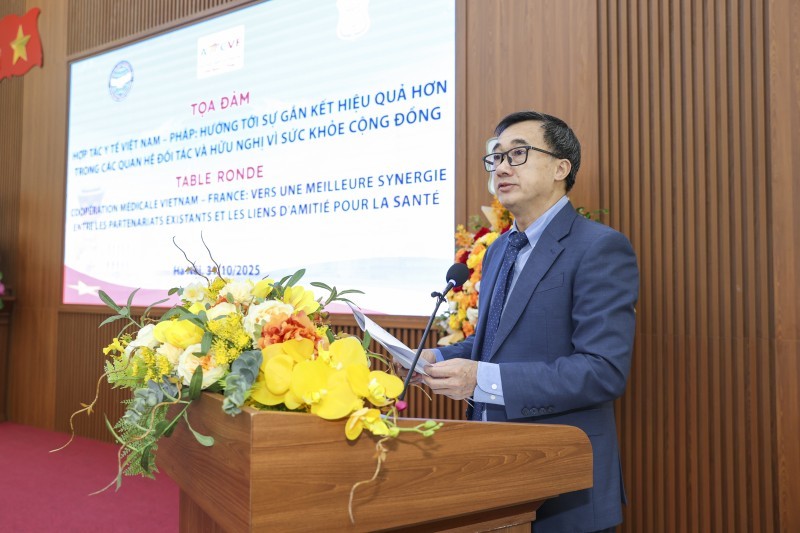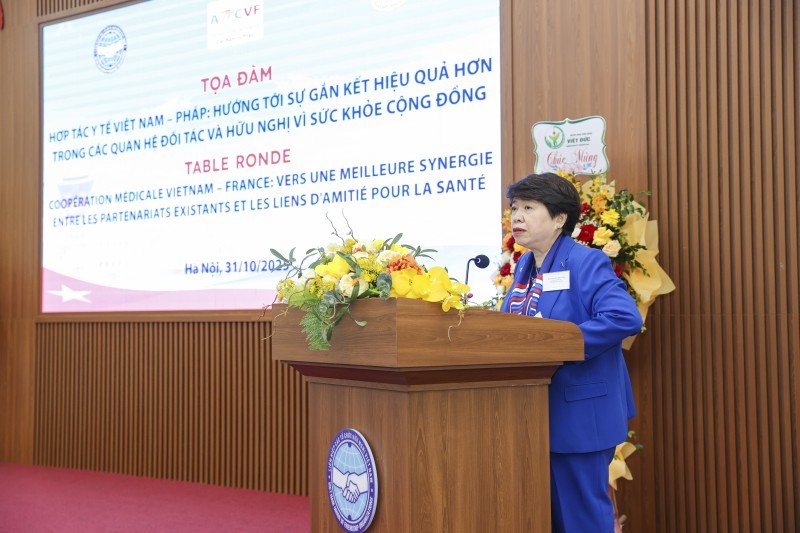Four Key Discussion Areas
The roundtable was attended by Nguyen Thuy Anh, Member of the Party Central Committee, Deputy Head of the Central Policy and Strategy Commission, President of the Viet Nam-France Friendship and Cooperation Association, and Chairwoman of the Viet Nam-France Parliamentary Friendship Group; Professor Dr. Tran Van Thuan, Deputy Minister of Health; and Phan Anh Son, President of the Viet Nam Union of Friendship Organizations. Also present were representatives from the French Embassy in Viet Nam, leaders of major hospitals, medical research institutes, and training institutions, as well as numerous experts, doctors, and scientists from both countries.
In particular, the event welcomed leaders of the France-Viet Nam Medical Association Federation (FSFV), which comprises more than 20 French medical associations, representatives of the French Academy of Medicine, members of the Vietnamese National Assembly, and a large number of medical professionals and scientists from both sides.
In his remarks, Deputy Minister of Health Tran Van Thuan emphasized the special significance of the event in fostering substantive connections among partners with the shared goal of improving public health. He affirmed that healthcare cooperation has long been one of the traditional, exemplary, and most effective fields within the framework of the Viet Nam-France Strategic Partnership.
 |
| At the roundtable. (Photo: Dinh Hoa) |
According to the Deputy Minister, Viet Nam’s healthcare sector is entering a new phase of development, actively implementing major Party resolutions such as Resolution No. 57 on Science, Technology, and Digital Transformation, Resolution No. 59 on International Integration, and particularly Resolution No. 72-NQ/TW of the Politburo on “A number of Breakthrough Solutions to Strengthen the Protection, Care, and Improvement of the people’s health.” All these resolutions highlight the goal of building a fair, high-quality, and efficient healthcare system that puts people at the center, with a strong shift from treatment to prevention and toward comprehensive healthcare.
In this context, international cooperation is regarded as a key driving force, in which partnership with France holds strategic significance, especially as the two countries elevated their relations to a Comprehensive Strategic Partnership at the end of 2024.
From the perspective of building a sustainable healthcare system, Deputy Minister Tran Van Thuan stated that Viet Nam and France still have ample potential to expand and deepen collaboration, particularly in areas where the two sides possess strengths and can complement each other.
 |
| Deputy Minister of Health Tran Van Thuan delivers remarks at the event. (Photo: Dinh Hoa) |
First and foremost, in medical training and human resource development, Viet Nam is promoting the standardization and internationalization of training programs for doctors, pharmacists, nurses, and public health professionals, with a focus on practical skills and outcome-based standards. A significant step forward will be the introduction of the National Licensing Examination for Healthcare Practitioners in 2027, overseen by the National Medical Council, which aims to objectively and transparently assess professional competence in line with regional and international standards.
In this process, cooperation with countries that have advanced medical education systems, such as France, will play a particularly crucial role, from residency and specialized training to the development of dual-degree programs and mutual recognition of professional qualifications.
Second, in scientific research and innovation, the two countries can collaborate on highly applicable projects in preventive medicine, biotechnology, precision medicine, artificial intelligence (AI), and medical technology transfer. These are fields in which France has a strong foundation, while Viet Nam is seeking access to cutting-edge knowledge to modernize its healthcare system.
Third, in public health, Viet Nam wishes to strengthen cooperation with France in the prevention of non-communicable diseases, management of cross-border health risks, emergency response, global health security, and adaptation to climate change, increasingly pressing challenges facing the world today.
Fourth, in the fields of pharmaceuticals, vaccines, and medical equipment, Viet Nam is focusing on completing its innovation ecosystem, encouraging investment and technology transfer, and establishing research and development (R&D) centers. These efforts aim to enhance national self-reliance and strengthen domestic capacity.
To concretize these areas of cooperation, the Vietnamese Ministry of Health and the French Ministry of Public Health are currently promoting the signing of a bilateral healthcare cooperation agreement, which has been reviewed by the Ministry of Justice and is awaiting approval by the Prime Minister.
Healthcare Cooperation - Traditional, Exemplary, and Most Effective Partnership
Member of the Party Central Committee, Deputy Head of the Central Policy and Strategy Commission, President of the Viet Nam-France Friendship and Cooperation Association, and Chairwoman of the Viet Nam-France Parliamentary Friendship Group Nguyen Thuy Anh emphasized: “If Viet Nam-France healthcare cooperation is a precious legacy of history, then today, that relationship has become deeper, more diverse, and more vibrant than ever.”
According to her, the close connection among hospitals, research institutes, universities, and medical professionals of both countries has been nurtured through friendship, trust, knowledge sharing, and mutual respect - the core values of the Viet Nam-France Comprehensive Strategic Partnership.
 |
| President Nguyen Thuy Anh delivers remarks at the roundtable “Healthcare Cooperation Toward the 70th Anniversary of Viet Nam–France Friendship.” (Photo: Dinh Hoa) |
The roundtable took place at an important juncture, as Viet Nam and France look toward new goals in healthcare collaboration. On this occasion, representatives of French authorities and experts - from one of the world’s leading healthcare systems, reflected on the progress of bilateral cooperation, evaluated key achievements, and shared valuable practical experiences.
The delegates unanimously affirmed that healthcare cooperation is a traditional, exemplary, and most effective area of collaboration within the framework of the Viet Nam-France Comprehensive Strategic Partnership. Evidence of this includes the fact that over 3,000 Vietnamese doctors have been trained in France, many of whom now hold key positions in hospitals, research institutes, and health management agencies in Viet Nam. At present, there are nearly 100 active partnerships directly linking medical and training institutions of the two countries.
Among them, the France-Viet Nam Medical Association Federation (FSFV) plays a crucial coordinating role. It has closely collaborated with Vietnamese partners to successfully organize five France-Viet Nam Medical Conferences, including two hosted at Hanoi Medical University. These cooperative activities have not only produced valuable technical and professional outcomes but have also embodied the profound humanitarian values, solidarity, and spirit of innovation that characterize the bilateral relationship.
The roundtable reached a consensus on major cooperation orientations for the new phase, in line with the Politburo’s Resolution No. 72-NQ/TW on “A number of breakthrough solutions to strengthen the protection, care, and improvement of people’s health.” Priority areas of cooperation include high-quality medical human resource training, technology transfer, digital health collaboration, preventive medicine, vaccines, pharmaceuticals, and the application of artificial intelligence (AI) in healthcare.
At the event, representatives from major hospitals such as K Hospital, Bach Mai Hospital, Viet Duc Hospital, E Hospital, and the University of Medicine and Pharmacy - Viet Nam National University, Hanoi, discussed specific aspects of the upcoming Viet Nam-France Healthcare Cooperation Agreement. They proposed numerous initiatives and recommendations aimed at building a shared, sustainable vision for future collaboration.
As part of the event, the Viet Nam Union of Friendship Organizations presented the “For Peace and Friendship Among Nations” Medal to several French professors and doctors in recognition of their outstanding contributions to bilateral healthcare cooperation. This gesture carried profound humanitarian significance, serving to strengthen solidarity and friendship and to promote people-to-people exchanges between the two countries.
Source: Vietnamtimes

.webp)









